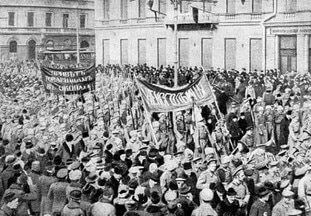 This week marks the centenary of the end of the Russian Empire. Tsar Nicholas II abdicated on 15 March 1917. He had attempted to reach the royal palace at Tsarskoe Selo, but revolutionaries had occupied the train stations around Petrograd, the imperial capital, and palace guards refused to support the imperial family. Realising he had lost almost all support in the country, the Tsar was forced to stand down. The Project 1917 website has some wonderful quotes from those involved. “All around is betrayal, cowardice and deceit!” decried Tsar Nicholas. Alexander Kerensky, justice minister in Russia’s Provisional Government said, “A free Russia has been born, and no one will succeed in prising this freedom from the people’s hands”. And here’s a fabulously unstatesmanlike quote from the Britain’s King George V: “I fear Alicky [ie, the Tsarina, Alexandra Feodorovna] is the cause of it all and Nicky [Tsar Nicholas] has been weak.” But not even a revolution could distract the composer Sergei Prokofiev from his work: “Thousands, tens of thousands of people are wandering the streets today with red bow-knots on their chests. This monotonous loitering has begun to annoy me. Right now I sit at home and work with great pleasure, I finished the 3rd sonnet and continued working on the violin concerto. Here’s a great picture portraying that Prokofiev might have seen from his window. The February Revolution centred on Petrograd, its name having been changed from St Petersburg at the start of the war in 1914 to make it sound more Russian. But its effects were felt across the empire. Here’s an extract from A Forgotten Land describing events in Kiev as the empire crumbled: “The mood in the streets changed overnight with the tsar’s abdication. Decades – even centuries – of fear were lifted and the population brimmed with excitement and optimism. Not just Jews, but Ukrainian factory workers, railway men and labourers all rejoiced in the new sense of hope. Jubilant processions were swiftly organised, concerts planned and enthusiastic bands of actors performed hastily rehearsed plays that had previously been banned.” And another on the effects on the Jewish community: “Under the tsars, the Jews had been stifled. We had experienced nothing but suffering at the hands of the authorities ever since our land had become part of the Russian Empire. […]Now, at last, we felt we could breathe. Kerensky would change everything. He was a socialist, a democrat and an amazing orator. He was an almost god-like figure and my family worshipped him. He roused the inhabitants of the Pale [the area where Jews were forced to live under tsarist rule] with is powerful speeches proclaiming that from now on, nobody in Russia would face discrimination on the grounds of religion or race. For the first time, Jews would be able to travel freely; to study and work in regions and professions from which we were previously barred; to settle wherever we wished, buy land of our own. There was a great feeling of hope, a new dawn.” Extracts from A Forgotten Land
0 Comments
Leave a Reply. |
Keeping stories aliveThis blog aims to discuss historical events relating to the Jewish communities of Ukraine, and of Eastern Europe more widely. As a storyteller, I hope to keep alive stories of the past and remember those who told or experienced them. Like so many others, I am deeply troubled by the war in Ukraine and for the foreseeable future, most articles published here will focus on the war, with an emphasis on parallels with other tumultuous periods in Ukraine's tragic history. Archives
March 2024
Categories
All
|
 RSS Feed
RSS Feed
